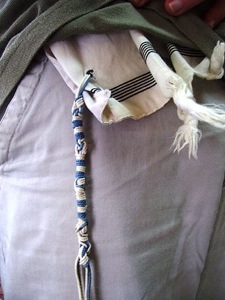I’m not good with colours.
It’s not really my fault. I’ve got that weird form of colour blindness that makes it difficult to distinguish various shades. To me, some shades of blue look purple, which makes me a bit of a liability when being asked if paint or clothes go together.
So when I read that a scientist has potentially identified the source of a blue dye used in making priestly garments in ancient Israel, I was intrigued and found myself down a bit of a rabbit warren.
Now, to me one shade of blue is as good as another, so I’ve never really thought much about the command that the ancient Hebrews should see blue tassels onto their clothes. Turns out it’s a bigger deal than I thought.
(Lesson #1 of this blog: Never ignore the ‘trivial’ details, because there’s a good chance they’re not trivial at all.)
See, the writer of Numbers is referring to a particular shade of blue, tekhelet. So specific, in fact, that after Jerusalem fell to the Romans and the subsequent exile of the Jews from Israel, the use of the blue tassels fell out of favour because no-one was sure how to make the dye, and there was therefore a reluctance to break the Law by using the wrong shade of blue. That’s how seriously this was taken, that getting the colour right was so important that it’s now become a reminder through its very absence.
Because this isn’t about aesthetics, it’s about remembrance. The tassels were used as a reminder that God brought the Jews out of Israel and, in doing so, established his covenant with them. Having blue thread on your prayer shawl wasn’t a fashion choice, it was a signifier if your very identity. And that identity is bound up in daily life – this isn’t a photo album of memories that gets brought out of a cupboard every so often, it’s something you wear. Every time you put your clothes on, there’s a reminder that you’re a follower of God, and that has implications and importance for how you live from day to day.
It’s easy to forget the Story. God saves and redeems us and establishes us as his kingdom here on Earth, but immense as that is, it’s sometimes less tangible than jobs and traffic jams and getting the kids to school. Maybe that’s why there’s such an emphasis on physical acts of remembrance in the Hebrew Scriptures – the knowledge that no matter how intrinsic and vital God’s Great Story is, we’re a forgetful species. We miss even the most important things if they’re not stuck under our nose.
At the dawn of 2014, maybe we need to create physical reminders of what God’s done in our lives, to find our own shade of blue and bring our memories of his love and greatness into the everyday.
(There’s a recent episode of the podcast Stuff You Missed In History Class that covers the history of colours and dyes and their impact on society. Worth checking out!)



